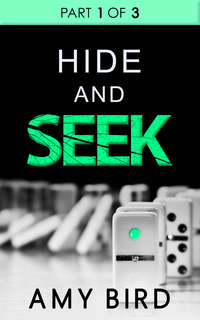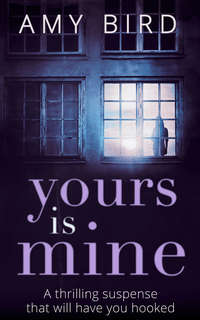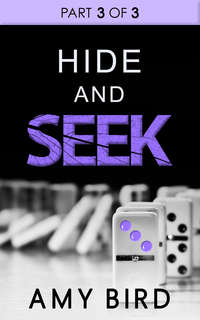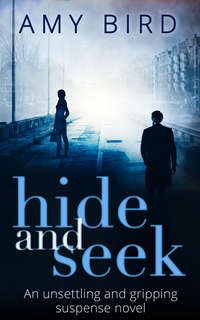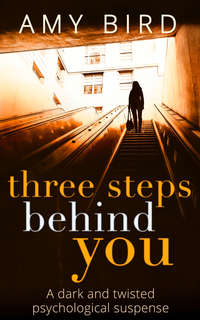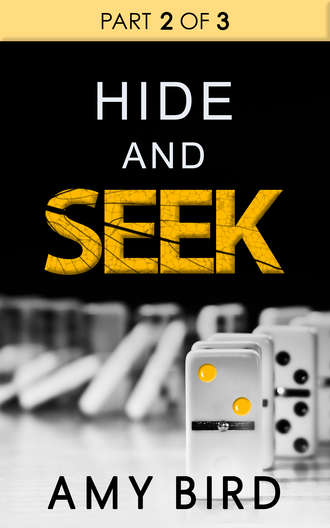
Полная версия
Hide And Seek
But it’s not Max I call for. “Mummy! Mummy!” I shout as the hand gets ever closer, the sea ever nearer.
There is no sign of Mummy. She doesn’t answer my call. But there is another sign. A sign from above – a clap of thunder. I look up from the piano and see a gap appear in the clouds above the sea. There is a presence there, with eyes and face but they are so indistinct, I cannot tell who they are. The presence, whatever it is, has a hammer. Like a Thor of DIY, the being waves the hammer, and brings it down from the clouds. The hammer fills the whole of the sky between the clouds and the sea. The hammer strikes the piano – crash! But the wood casing of the piano is intact. And the mighty hand continues, progressing closer and closer to me.
“Mummy!” I’m screaming. “Mummy!”
The hammer is raised again up into the sky, but even as the giant piano-hand has revealed another gap into the sea beneath, the hammer is coming down again. And up. And the piano hand is now on the key next to me and in only a moment I will, I must, fall into the sea below, unless I can just jump along to the next key. But no; the hammer is being swung again. If I could just make the presence realise I’m here, make it notice me, then it will stop, won’t it?
“I’m here! I’m here! I’m here!” I shout.
But the presence either ignores me or doesn’t hear because down comes the hammer, and along comes the hand. I try to scale the black key above me in case the hand is not playing the sharps, but the sides of the key are too slippery and besides, I see now that the hand is playing both black and white. And as the hammer from the Thor-presence hits the piano, the hand comes level with me. And the void to the sea opens up, and I’m falling, falling, falling, my face to the sky. I see as the waves close around me that the presence is not unknown, it is very known. It is Mummy, Mummy, Mummy.
And then I’m not in a piano, I’m in a bed, and there’s another Mummy, but a different Mummy, a Mummy-to-be, and it’s saying “Will! Will! Shh, you’re fine, you’re fine.”
I try to tell her, “But I’m not, because the sea will get me, and she, she, and the hammers… What?”
And then I realise it’s my bed, and the sea that’s here is just the sea of my sweat, the waves just me tossing and turning. And I’m here with my Ellie. For a moment there is a swell of relief. But only for a moment. Because then I think back to the other dreams. The pianos. The hammers. The water. What if they’re not just dreams? What if they’re memories?
Chapter Four
-Ellie-
Well, the valium didn’t help much. So it’s on to plan B. The funeral.
“You gained a father so quickly,” I tell Will. “And then lost him again. It’s classic grief you’re experiencing – anger, frustration, interrupted sleep. We need to let you mourn, properly. In the open.”
“You want me to visit his grave?” he asks me, taking a sip of his tea.
Not getting it yet, then.
“You can do that too, of course – and you should. But I mean the whole thing,” I explain. “The whole mourning process. Your own version of a funeral for him. I’ll do a reading. We’ll light a candle. You can cry. We don’t need to tell anyone. But it will be cathartic. Trust me.”
I have the experience here and he knows it. Will doesn’t answer immediately. I take a sip of my peppermint tea to show that this is a chilled out thing, with no pressure. That there’s no competitive mourning, no seasoned orphan one-upmanship going on. Just love. When he still doesn’t respond, I’m thinking of my next move – a bit of a lower lip quiver, bit of a sob about how his disturbed sleep patterns are affecting me, when I’ve only just started sleeping again. A bit manipulative, maybe, but I know best, right? Or I will do, when I’m a mother – which will be soon. So I must be in the early stages of knowing best now. If only Will would acknowledge it.
But then he finally says something useful. “And then we can move on?”
So I nod, with great understanding. “When you’re ready,” I say, mentally adding ‘Please move on soon, I need my sleep.’
“A proper funeral?” he asks.
“A proper funeral,” I confirm.
And then, he like really gets the idea. Before I can stop him, he’s run off for the Yellow Pages and is looking up undertakers and God knows what else. All these conversations on the phone in the next room. Well, I’m not going to intervene. It’s his funeral. I can take a little cat-nap here on the sofa, while he does all his preparations.
The doorbell rings at some point and I’m sure I hear chatter about a coffin. Will sounds upbeat about something. Actually sounds happy. So it must be a dream. I close my eyes again. And I must have slept for a bit, because Will has been really busy. I don’t find out how busy until bedtime, when there’s something stiff on my pillow (lucky me). Except it’s not Will. It’s a formal envelope, addressed to me. Will used to do this with anniversary cards, but this isn’t a special date. I wouldn’t have forgotten. OK, so I did, once, but never again.
“What’s this?” I ask Will, about the envelope, as he slides off his trousers. Oh, hello, not the only stiff thing. Looks like the bump will be getting some action tonight, finally.
“Your plan,” he says.
Inside the envelope, in Will’s best copperplate, black ink on white card, I read:
‘A celebration of the life unknown; a burial of the life not lived.
In remembrance of Max Reigate, father and pianist.
Tomorrow, at dawn.’
Is this some grim attempt at humour? I look up at Will. He’s not smiling. Not a joke, then. He is taking my suggestion seriously. So I need to show I’m proud of his engagement with my idea, like the good little nurturer I am. I climb across the bed and squeeze his hand. He squeezes back. I squeeze him some more. He kisses my lips (top ones). Oh my. Am I out of purdah? I stick my tongue into his mouth. He pulls up my nightdress and he is straight in there. Foreplay, you could at least send me a postcard, wherever you’ve gone. But I’m not so sure I wish you were here. Because Will, he finally wants me again. He needs me, bump or no bump. So he is in, then out, then in then out, then i-i-n at a slower rate and o-u-t for three still slow, then in in in, out out out. It’s a new rhythm, one he’s not used before. When we get to the afterglow – which, um, actually, I’m feeling will be quite glowing – I can tease him that his father’s death has in some ways done him good.
And then I realise. The rhythm he’s using is the one he has been tapping on chairs and tables and drumming in his sleep. It is his father’s rhythm. It is the rhythm of the Max Reigate concerto.
I try to vary the pace. But I can’t: they are his thrusts and I daren’t force myself too much against him, or pull him too much towards me for fear, however unfounded, of damaging the baby. And – ahh – actually – seems like my body is responding. Pretty perfect rhythm, you know. And so I’m kind of locked into it. And Will’s varying his ins and his outs in tempo to the music that must be in his brain. Our breath…it becomes…this ragged…accompaniment. The crescendo, it mounts and Will is in out out, in out out, in out out. In in out. In in out. IN OUT IN, IN OUT IN, IN OUT IN, IN IN IN IIIIIINNN.
Pianorgasm.
Together, we lie silent. Inside me, I can feel Leo doing little somersaults. But this isn’t about him, right now.
I’ll need to say something, acknowledge what just happened.
“I love your father’s music,” I say, putting that tender jokey edge in my voice.
“Me too,” Will says, with no joke in his.
And he rolls away from me. He doesn’t hold me. There is no glory of my bump. I am not even there for him.
So I wonder, as we turn off our bedside lamps, whether he even knew the rhythm he was making love to. Whether he knows just how much Max is inhabiting – inhibiting – him. And whether it really all will be all right in the morning.
Chapter Five
-Sophie-
Crotchets and quavers still remind me of the pall-bearers. Like black-hatted heads above the line of the coffin, they stand out starkly against the staves of the composition book. Whose book is it? I turn to the front. Oh, Emilie Beaumont. All très jolie with her blonde ringlets and big brown eyes, until the tantrums start. Then she turns red and cries and stamps her foot. How I hate children like her. So, yes, young Emilie’s quavers, malformed and straggly and in a major key as they are, do their funereal march across the page. I nearly didn’t even go to Max’s funeral, to see those pall-bearers. Nearly stayed away. Couldn’t face him being lowered into the ground. All those people, staring. Whispering their suspicions. Pointing their black-gloved fingers at us both, me and Guillaume. But it would have been more dangerous not to go. We’d have been conspicuous by our absence. And things might have been said. Things I couldn’t control.
And so I went. And what I remember most is that some awful organist tried to play an extract of Max’s work, but they played it so badly it was almost unrecognisable. I’d been silently weeping before, but I made it my job to sob big loud sobs when that music started, just to cover up the horror of what it meant, for Max actually to be dead, for his genius to be lost, for him never to play his own music ever again, just to be played badly by mediocre hobbyists. And little Guillaume, I think he tried to take my hand, but I wouldn’t let him. I wouldn’t let him. So that, besides everything else, gets added to the guilt list.
It’s not just notes, though, that are like death. Pianos, too, have their reminders of the mortality of Max. At first, I was not even able to look at a piano. It was not just their resemblance to coffins. It was that I felt I was looking straight at Max. But not live Max; Max laid out dead on the hospital bed. The keys were like the ribs of a skeleton, topped and tailed not by anything as useful as a head – just black nothingness at the end of the run.
But then when the realisation of his absolute final gone-ness hit me (appropriately, like a blow), I turned to pianos for solace. I liked to press my face against the keys, to hug the shiny wooden body, to run a finger along the red felt that separated the two. I was thrown out of several music stores. At the time, I found it heartless. On reflection, I suppose it may have been my unnaturally dilated pupils, that over-stimulated frenzy, and the fact I talked to the pianos, that meant the security guards were compelled to remove me. Little Guillaume would slink out behind me. Half the time, I wasn’t even aware of bringing him with me, but he’d turned up, all the same. It would have been so easy just to leave him in one of those piano shops. Open up one of the lids of a grand piano, stow him inside, then shut it again. Leave his head pressed against all those strings. Hammers coming down at his temples.
Arrête, Sophie – tu te rends folle. And I don’t want to drive myself mad. Madness would not be helpful. Madness doesn’t get you an income. Marking that little bitch Emilie Beaumont’s work would get me an income. Shut off the pain, the guilt, the feeling, like before. When you allowed yourself back into music again. Not to play professionally any more, not like when I met Max. My violin is well and truly shelved. Smashed, in fact. It had seemed like a good idea, at the time. I couldn’t sit in an orchestra again, hear that build-up of sound, the passion that went with it. Max’s piano would always have been centre-stage, in my mind. Like the first time, when I was part of the orchestra that recorded the first concerto. We’d joked, when he’d started his next piece (a quirky piano-only concerto), that he’d only written his earlier concerto with orchestra so that he could snare the first violinist. Now he had one, he could move on to solo work. Not that I was his first violinist. His piano had built up its share of notches.
I toss Emilie’s composition book to one side. It isn’t happening. I’m having a Max moment. If I can just engage in that, maybe I’ll finally get closure, put it all to one side. So, let’s psychoanalyse: did I feel rejected that he didn’t want my violin accompaniment, in that second concerto? Maybe. Maybe that’s why we argued in the run-up to that second recording. Or maybe it was still because of Guillaume, the distance I felt since he was born. Not just from Max, but from everything. The distance I tried to close by shouting. By throwing plates, sometimes. And, yes, make yourself confront it – other things. I would quite literally give anything for us not to have argued that evening. Had I known what the consequences would be.
So yes, maybe that’s why I put the violin to a violent rest. Pursued teaching, the ‘easier’ option. But then, of course, came the impact of the staves. The horror of those notes, their little black heads against the white and black background! How could they be innocently suggesting a tune? How could they not represent Max, lying on that black and white chequered floor? Follow the head, they seemed to be saying, follow the head as it moves about. Hit that note, get it just right, position it evenly on the line, strike it through. And worse, far worse, sometimes the heads had little tools next to them, the sharps, so shaped that they looked like –
No! It had been too much. And so I’d told all my students to do composition on blue staves in pencil. Found a little cheap supplier of poor quality composition books, whose staves had meant to be black but had turned out blue. Bought them from my own salary. Told the pupils that is how real composers work. They believed me; and their parents did too. They are professionals, not artists, those parents. What does a doctor or a lawyer know about music? I could almost hear them ignorantly boasting to their friends about the authentic musical education their talentless children were getting. Shame they also chose to talk about it to the Head of Music. He called me in to see him. He said he’d surveyed many composers and none of them had heard of my theories. Idiot. He didn’t know any real composers. Not composers like Max. Max didn’t care whether he wrote in pen, or pencil, or blood, on black staves or blue, or even any staves at all. He just created and played. But I couldn’t say that, could I? Couldn’t let on, about Max. It had been a risk, even putting my connections with that orchestra on my CV, even though I knew I needed to, to get the job, to validate myself. Didn’t mention Max’s name though. Just said I had led the strings section in the works of ‘various contemporary composers’. I’m sorry, Max. Again.
And now, there it is. The reason I don’t indulge in this. There is the familiar welling of sorrow. It will drag me down, down to Bois de Boulogne. And I can’t go that way again. Won’t. I’ve worked so hard to rescue myself. And besides, it wouldn’t even give me safety there, now. I’m not so young. Maybe I wouldn’t be at risk of rape. But now that I’m ‘older’ – I never was older, with Max, him being five years my senior – they would probably see an old lady, mug me. Take my bag, sell my identity, before I could buy a new temporary one from them and shoot it up into my veins.
So, instead, now, let us see what mes enfants terribles have concocted for me. Has little Emilie made any sense of my instructions? I wonder if when they compose, these children, they become the awful anti-social ogres that Max used to become. They certainly do not have the excuse of genius. I tut, crossing out a stray sharp that had found its way into C Major. I tell them C Major is the learning key. They don’t need to trouble themselves with sharps. Or worse, flats, with that great curved weight on the end of them, sitting right next to the note head. So many of them, ironically, in Max’s first concerto, written in B-flat Minor. If he’d chosen that key deliberately to court comparisons with Tchaikovsky it had certainly paid off: reviewers claimed he was as ‘bold’, ‘heroic’, ‘fierce’ and ‘eerie’ as the great Russian, ‘taking listeners to the same depths of melancholy and heights of passion’. None of that, in the year I teach. We play it safe in C Major. Although there is a danger, doing everything in the relative key to Max’s second concerto. A Minor. Just as haunting as his first. Perhaps even more so. For how it ended. Perhaps I’ve spent these teaching years intentionally skirting dangerously close to his memory – keeping him near but far enough away not to trouble me. But I don’t teach them about relative scales here. They can learn all that when they get to lycée. Until the Head of Music finds out, and quibbles it.
Yes, genius had been Max’s every excuse. For his hours of silence, his refusal to co-operate in household chores, his dreadful failure to acknowledge Guillaume when the boy wanted to play. His excuse for everything. Not that he even needed an excuse when we first started going out. I just enjoyed watching his genius. It was like he was making love to the piano. It was the same face when he was striving to orgasm. The same lifting up and down of his hips at the piano as he reached the climax. Except later on he saved the intensity for the piano. Apart from when Guillaume was conceived. He gave a virtuosic performance then, when it mattered.
So, yes. At least his excuse was valid: genius. The question is – was mine?
Chapter Six
-Ellie-
The bed is empty. It’s still dark. I look at the clock. 4am. Will must have gone to the bathroom. At any moment there’ll be the familiar pull of the chain and the dozy stumbling back to bed. That used to be my domain, in the first months of having little Leo in my belly – the sudden stumbles to the bathroom, the groggy return. But things have settled down, now, for me. Still I wait. And wait. 4.20am. I guess in a few months’ time I’ll probably consider six hours’ uninterrupted sleep, preceded by oddly arousing sex, to be a very good deal. So, out of bed, let’s find out what’s going on. Opening the bedroom door, I head to the bathroom. The room is dark and empty; no Will. Through the frosted window there’s a faint glow. If I just stand on tiptoes to look through the non-frosted upper section, I can see out into the night.
Fire! OK, so that’s the sleep gone. Will is standing in the garden surrounded by fire. I scrabble with the sash lock on the window and throw it upwards. Yes, there he is – great orange flames in front of him.
“Will!” I shout out of the window. “What are you doing?”
But he doesn’t reply. Maybe he can’t hear me over the sound of the flames. I pull my dressing gown from the hook on the bathroom door and run downstairs as quickly as I dare. Mustn’t trip; mustn’t hurt the baby. I slip on some shoes, unlock the back door and run out into the garden.
“Will!”
Now that I’m out here, the flames are both less and more alarming. Less, because I can see they’re coming out of the leaf incinerator, so he’s not actually randomly setting fire to the lawn. More, because of their roaring intensity, and because of Will’s expression staring into them. His mouth is twisted into a mixture of sadness and anger. His eyes do not blink, but from them escape tears.
He doesn’t seem to have noticed me appear in the garden. So I walk to him, round the flames. I put a hand on his shoulder.
“Will?” I ask, as gently as I can, like I’m dealing with a small boy, even though inside I’m screaming ‘What the fuck are you doing?’
He jumps a little and looks round at me. He smiles slightly and holds up one hand.
“Hey,” he says, in greeting. “You’re early.”
“For what?” I ask.
“The funeral.”
Oh. Of course. The dawn funeral. But there is not yet any sign of the sun in the sky.
“I thought I’d get the pyre and everything ready, for when you were awake,” he continues.
Конец ознакомительного фрагмента.
Текст предоставлен ООО «ЛитРес».
Прочитайте эту книгу целиком, купив полную легальную версию на ЛитРес.
Безопасно оплатить книгу можно банковской картой Visa, MasterCard, Maestro, со счета мобильного телефона, с платежного терминала, в салоне МТС или Связной, через PayPal, WebMoney, Яндекс.Деньги, QIWI Кошелек, бонусными картами или другим удобным Вам способом.


